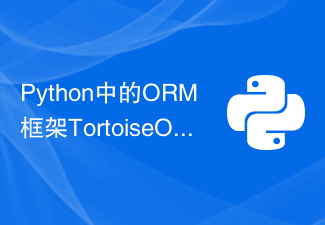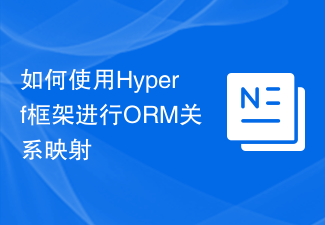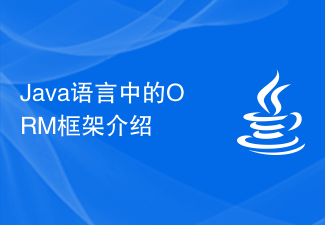Object Relational Mapping (ORM) is a technology that solves the mismatch between object-oriented and relational databases. Simply put, ORM automatically persists objects in a program into a relational database by using metadata that describes the mapping between objects and databases. Essentially converting data from one form to another.
ORM provides the generation of all SQL statements, and coders are far away from database concepts. Mapping from a conceptual requirement (such as a HQL) to a SQL statement costs nothing, not even 1% performance loss. The real performance hit is during the mapping process, and more specifically, during object instantiation.
At present, the more famous ORMs for PHP open source include the following:
1. Propel
Propel is an ORM mapping (Object Relational Mapping) framework suitable for PHP5. It provides object persistence layer support based on Apache Torque. It generates SQL and classes through schema definition files in XML format and corresponding configuration files. It allows you to use objects instead of SQL to read and write records in database tables. Propel provides a generator to create SQL definition files and PHP classes for your data model. Developers can also easily customize the generated classes. We can also integrate Propel into existing application development frameworks through XML, PHP classes and Phing build tools. For example, versions before 1.2 of the PHP framework symfony are used by default. A streamlined version of Propel serves as the default ORM framework.
Official website: http://www.propelorm.org/
2. Doctrine
Doctrine is a PHP ORM framework. It must run on >=php5.2.3 version. It is a powerful data abstraction layer.
One of its main features is the use of object-oriented methods to implement database query sealing. Its bottom layer uses a DQL query statement similar to Hibernate HQL to perform database queries, which makes development more flexible and greatly reduces the cost. Duplicate code. Compared with Propel, the advantage of Doctrine is that it supports full-text search. Doctrine's documentation has always been more comprehensive and richer than Propel, the community is more active, and it is more natural, easier to read, and closer to native SQL. Performance is also slightly better than Propel. Similarly, you can easily integrate Doctrine into existing application frameworks. For example, the PHP framework symfony and later versions use Doctrine as the default ORM framework, and you can also integrate Doctrine with Codeigniter.
Official website: http://www.doctrine-project.org/
3. EZPDO
EZPDO is a very lightweight PHP ORM framework. The original intention of the author of EZPDO is to reduce the complex ORM learning curve and strike a balance between ORM operating efficiency and functionality as much as possible. It is the simplest ORM framework I have ever used so far, and I still want to integrate it. Come to my CoolPHP SDK, and the running efficiency is quite good, and the functions can basically meet the needs, but the update of ESPDO is relatively slow.
Official website: http://www.ezpdo.net/blog/?p=2
4. RedBean
RedBean is an easy-to-use, lightweight PHP ORM framework that provides support for MySQL, SQLite & PostgreSQL. The RedBean architecture is very flexible and the core is very simple. Developers can easily extend functions through plug-ins.
Official website: http://www.redbeanphp.com/
5. Others
The domestic fleaphp development framework implements ORM implementation based on TableDataGateway; in addition to providing encapsulation of SQL statements, Zend Framework also implements TableGateway, TableRowSet, and TableRow; there are also some solutions similar to Rails' ActiveRecord implementation.
In general, the general ORM framework can meet the basic needs of simple application systems, which can greatly reduce the difficulty of development and improve development efficiency. However, it is definitely worse than pure SQL language in terms of SQL optimization. , the processing of complex relationships and SQL embedded expressions may not be ideal. Perhaps this is mainly due to the problem of object persistence in PHP itself, which results in ORM being too inefficient and generally slower than pure SQL. But there are ways to solve these. The most basic solution to performance is that we can improve efficiency through caching. For Hibernate, although the configuration is complicated, it greatly alleviates the problem through the flexible use of second-level cache and query cache. The query pressure of the database greatly improves the performance of the system.
If you want to implement a PHP ORM yourself, you can refer to the following:
<?php
abstract class Model{
protected $pk = 'id';
protected $_ID = null;
protected $_tableName;
protected $_arRelationMap;
protected $_modifyMap;
protected $is_load = false;
protected $_blForDeletion;
protected $_DB;
public function __consturct($id = null){
$this->_DB = mysql_connect('127.0.0.1','root','') ;
$this->_tableName = $this->getTableName();
$this->_arRelationMap = $this->getRelationMap();
if(isset($id))$this->_ID = $id;
}
abstract protected function getTableName();
abstract protected function getRelationMap();
public function Load(){
if(isset($this->_ID)){
$sql = "SELECT ";
foreach($this->_arRelationMap as $k => $v){
$sql .= '`'.$k.'`,';
}
$sql .= substr($sql,0,strlen($sql)-1);
$sql .= "FROM ".$this->_tableName." WHERE ".$this->pk." = ".$this->_ID;
$result =$this->_DB->mysql_query($sql);
foreach($result[0] as $k1 => $v1){
$member = $this->_arRelationMap[$key];
if(property_exists($this,$member)){
if(is_numeric($member)){
eval('$this->'.$member.' = '.$value.';');
}else{
eval('$this->'.$member.' = "'.$value.'";');
}
}
}
}
$this->is_load = true;
}
public function __call($method,$param){
$type = substr($method,0,3);
$member = substr($method,3);
switch($type){
case 'get':
return $this->getMember($member);
break;
case 'set':
return $this->setMember($member,$param[0]);
}
return false;
}
public function setMember($key){
if(property_exists($this,$key)){
if(is_numeric($val)){
eval('$this->'.$key.' = '.$val.';');
}else{
eval('$this->'.$key.' = "'.$val.'";');
}
$this->_modifyMap[$key] = 1;
}else{
return false;
}
}
public function getMember($key,$val){
if(!$this->is_load){
$this->Load();
}
if(property_exists($this,$key)){
eval('$res = $this->'.$key.';' );
return $this->$key;
}
return false;
}
public function save(){
if(isset($this->_ID)){
$sql = "UPDATE ".$this->_tableName." SET ";
foreach($this->arRelationMap as $k2 => $v2){
if(array_key_exists( $k2, $this->_modifyMap)){
eval( '$val = $this->'.$v2.';');
$sql_update .= $v2." = ".$val;
}
}
$sql .= substr($sql_update,0,strlen($sql_update));
$sql .= 'WHERE '.$this->pk.' = '.$this->_ID;
}else{
$sql = "INSERT INTO ".$this->_tableName." (";
foreach($this->arRelationMap as $k3 => $v3){
if(array_key_exists( $k3,$this->_modifyMap)){
eval('$val = $this->'.$v3.';');
$field .= "`".$v3."`,";
$values .= $val;
}
}
$fields = substr($field,0,strlen($field)-1);
$vals = substr($values,0,strlen($values)-1);
$sql .= $fields." ) VALUES (".$vals.")";
}
echo $sql;
//$this->_DB->query($sql);
}
public function __destory(){
if(isset($this->ID)){
$sql = "DELETE FROM ".$this->_tableName." WHERE ".$this->pk." = ".$this->_ID;
// $this->_DB_query($sql);
}
}
}
class User extends Model{
protected function getTableName(){
return "test_user";
}
protected function getRelationMap(){
return array(
'id' => USER_ID,
'user_name'=> USER_NAME,
'user_age' => USER_AGE
);
}
public function getDB(){
return $this->_DB;
}
}
$UserIns = new User();
print_r($UserIns);
?>
 Python中的ORM框架Tortoise ORM实战Jun 10, 2023 pm 06:05 PM
Python中的ORM框架Tortoise ORM实战Jun 10, 2023 pm 06:05 PMTortoiseORM是一个基于Python语言开发的异步ORM框架,可用于Python异步应用程序中管理关系数据库。本文将介绍如何使用TortoiseORM框架来创建、读取、更新和删除数据,同时还将学习如何从关系数据库中执行简单和复杂的查询。准备工作在开始本教程之前,你需要安装Python(建议使用Python3.6+),同时安装TortoiseOR
 PHP中的ORMMay 24, 2023 am 08:14 AM
PHP中的ORMMay 24, 2023 am 08:14 AM随着互联网的发展,Web应用程序的开发逐渐得到了广泛应用。而其中最主要的语言之一便是PHP。然而,对于数据的管理处理却一直是开发者面临的难题。为此,ORM成为了数据处理的一个不错的选择。什么是ORM?ORM全称为Object-RelationalMapping(对象关系映射),它是一种通过使用描述对象和数据库之间映射的元数据,将面向对象编程语言程序中的对象
 如何在Phalcon框架中使用ORM(对象关系映射)?Jun 03, 2023 pm 09:21 PM
如何在Phalcon框架中使用ORM(对象关系映射)?Jun 03, 2023 pm 09:21 PM随着Web应用程序的不断发展,相应的Web开发框架也不断涌现。其中Phalcon框架因其高性能和灵活性受到了越来越多开发者的青睐。Phalcon框架提供了许多有用的组件,其中ORM(对象关系映射)被认为是最为重要的之一。本文将介绍如何在Phalcon框架中使用ORM以及一些实际应用示例。什么是ORM首先,我们需要了解什么是ORM。ORM是Object-Rel
 对象关系映射(ORM)基础知识:了解Doctrine ORMJun 19, 2023 pm 03:43 PM
对象关系映射(ORM)基础知识:了解Doctrine ORMJun 19, 2023 pm 03:43 PM对象关系映射(ORM)基础知识:了解DoctrineORM当我们开发应用程序的时候,我们需要对数据库进行操作来存储和获取数据。但是,直接使用原始的数据库查询代码很不方便。我们需要将对象和数据之间建立映射关系,这就是ORM的作用。ORM将对象和数据库表之间自动进行映射和转换,可以轻松地进行数据操作,使得我们的代码更加容易维护。DoctrineORM是PHP
 java中orm框架有哪些May 04, 2023 am 11:55 AM
java中orm框架有哪些May 04, 2023 am 11:55 AM1.Hiberante面向对象的ORM,学习成本比较高。2.Mybatis半自动orm框架,需要自己写sql,方便sql与java代码分离。这里所谓的“半自动”是相对于Hibernate框架全表映射而言的,MyBatis框架需要手动匹配提供POJO、SQL和映射关系,而Hibernate框架只需提供POJO和映射关系即可。3.Bee一个新的ORM框架,同时具体Hiberante和Mybatis的优点。既可像Hibernate一样通过操作对象来操作数据库,也可以像Mybatis一样灵活写sql4.
 如何使用Hyperf框架进行ORM关系映射Oct 21, 2023 am 10:57 AM
如何使用Hyperf框架进行ORM关系映射Oct 21, 2023 am 10:57 AM如何使用Hyperf框架进行ORM关系映射引言:Hyperf是一个基于Swoole扩展的高性能的PHP框架,它提供了许多强大的功能和组件,包括ORM(对象关系映射)工具。本文将介绍如何使用Hyperf框架进行ORM关系映射,并提供了具体的代码示例。一、准备工作在开始之前,确保已安装好Hyperf框架,并正确配置了数据库连接信息。二、定义模型在Hyperf框架
 Python中的ORM框架Pony ORM实战Jun 09, 2023 pm 10:46 PM
Python中的ORM框架Pony ORM实战Jun 09, 2023 pm 10:46 PMPython是一种高级编程语言,可用于Web开发、数据分析、人工智能等领域。在Python开发过程中,ORM(对象关系映射)框架是必不可少的一部分,ORM框架可以帮助我们轻松地将数据库和应用程序之间的数据进行交互。在本文中,我们将以PonyORM框架为例,介绍ORM框架在Python中的应用。PonyORM是Python中一款轻量级的ORM框架,与其他O
 Java语言中的ORM框架介绍Jun 10, 2023 pm 09:01 PM
Java语言中的ORM框架介绍Jun 10, 2023 pm 09:01 PM随着现代软件开发的趋势,大部分应用程序都需要与数据库进行交互。传统上,我们需要在代码中显式编写SQL语句来查询或更新数据库。然而,这种方式具有很多缺点,例如不易于维护和容易出错。为了解决这些问题,ORM(对象关系映射)框架应运而生,它允许我们在编写代码的同时,自动执行与数据库的交互。Java语言中有许多ORM框架,它们在不同领域和应用场景中都得到广泛使用。在


Hot AI Tools

Undresser.AI Undress
AI-powered app for creating realistic nude photos

AI Clothes Remover
Online AI tool for removing clothes from photos.

Undress AI Tool
Undress images for free

Clothoff.io
AI clothes remover

AI Hentai Generator
Generate AI Hentai for free.

Hot Article

Hot Tools

Zend Studio 13.0.1
Powerful PHP integrated development environment

Dreamweaver CS6
Visual web development tools

EditPlus Chinese cracked version
Small size, syntax highlighting, does not support code prompt function

ZendStudio 13.5.1 Mac
Powerful PHP integrated development environment

SublimeText3 Linux new version
SublimeText3 Linux latest version







